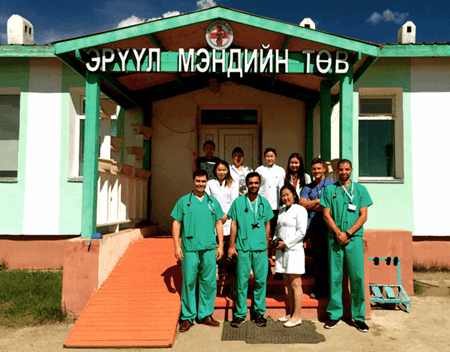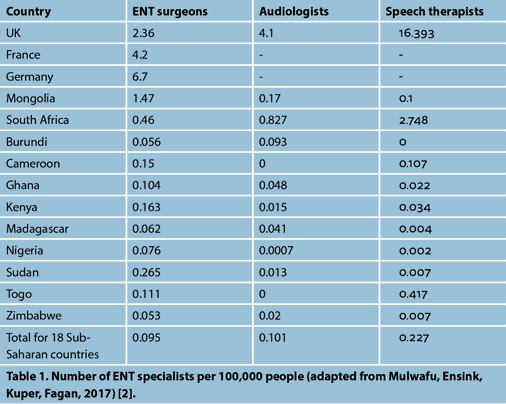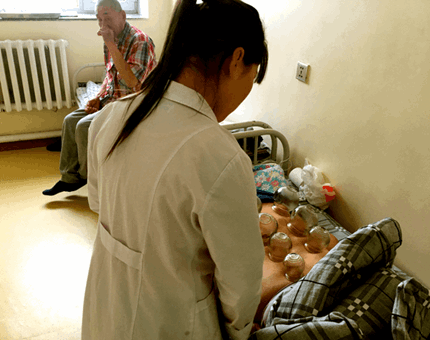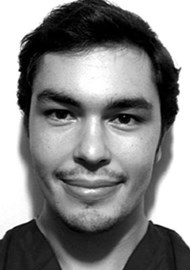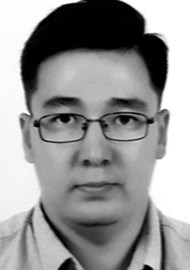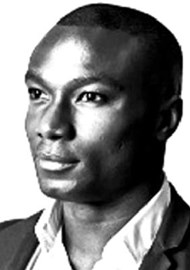Globally, the burden of ENT disease is great. Disabling hearing loss (DHL) for example, is reported to affect half a billion people worldwide. The majority of afflicted individuals live in lower and middle-income countries (LMIC) [1]. This article, a collaboration between a UK-based medical student and a Mongolian ENT specialist registrar, highlights some of the central challenges many LMICs face.
Aurélien Guéroult recently went on an elective placement to Mongolia, classed an LMIC by the organisation for economic cooperation and development (OECD). While working at the First Central Hospital of Mongolia, he interviewed ENT surgeons and asked them what could be done by colleagues in high income countries to assist them. A review of the literature and these interviews identified three areas where assistance is needed.
“One third of the Mongolian provinces have no access to an ENT surgeon at all.”
Students and hospital staff in Büregkhangai, Bulgan Province.
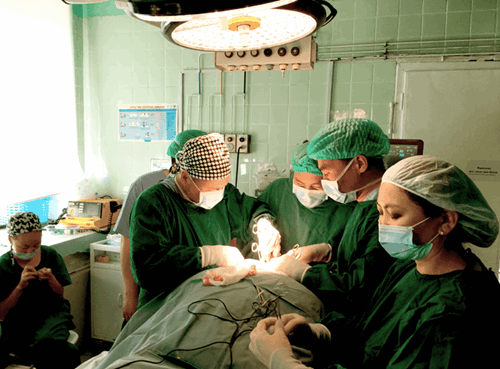
Consultant Surgeon, Otgonbayar Setevdorj, performs a thyroidectomy at the First Central Hospital of Mongolia.
Availability of specialist ENT services
“Giving all the equipment [a country] needs is not the way of developing its healthcare system. It is more important to give [our surgeons] the knowledge that is needed and train them. There is a lack of knowledge [in Mongolia] for neoplastic diseases… and we can’t manage these. We have some unfortunate cases where we have to advise them: sorry you had better go abroad.” Surgeon A
The current state of affairs
In the developing world, specialist ENT practitioners and training programmes are scarce. Table 1 shows the insufficiency of ENT services in Mongolia and Africa. Whilst Mongolia seems to do significantly better than African countries, these are almost entirely centralised in the capital, Ulaanbaatar. Mongolia is composed of 21 provinces but Ulaanbaatar is counted as a separate administration. One third of the Mongolian provinces have no access to an ENT surgeon at all. Additionally, Mongolia has no ENT allied health professional training programmes.
Availability of equipment
“There are operations we can’t do because we don’t have the instruments. Also, there is a real need in all of the provinces for apparatus to detect congenital deafness such as OAE and ABR.” Surgeon B
“Yesterday our operating microscope broke, it was 40 years old. Management doesn’t want to buy a new one – our new cases have all been stopped because of that.” Surgeon A
The current state of affairs
The availability of specialist equipment throughout the 22 administrative regions of Mongolia is summarised in Table 2; numbers in bold signify that the equipment is only available in Ulaanbaatar. The data was supplied by the Office of National Statistics of Mongolia. Gan-Erdene Narantsolmon performed a telephone survey of his peers for completion. It is evident that even within the capital, availability of certain important equipment is very limited. Hearing screening in any setting is almost non-existent.
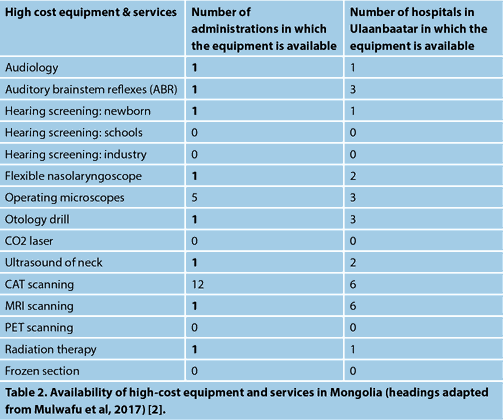
A nurse performs traditional cupping.
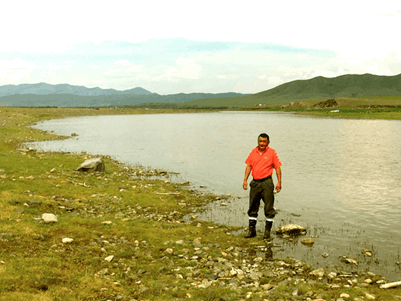
Tomro, Büregkhangai Hospital’s sole paramedic, stopping by a stream in Bulgan Province.
Improving availability of equipment
Here, the readership could improve the situation in different ways. This includes, but is not limited to, raising funds to purchase new equipment in developing world institutions or donating old functional equipment. Efforts should also be made to develop lower-cost healthcare in the developing world. One area that has shown particular promise is the use of smartphone-based applications (apps) for hearing screening programmes [3]. Although smartphone-based apps require further validation against gold-standard equipment, they may provide a low-cost alternative that facilitates hearing screening programmes in LMICs.
Health policy
“The knowledge of the population is very limited and they take advice from shamans for disease.”
About noise exposure in industry: “Working without protection is illegal, but no one follows the rules.”
About politics: “I don’t want to say much. All I can say is corruption. Politics has never impacted positively on healthcare.” Surgeon A
The current state of affairs
Hearing screening programmes are few and far between in the developing world, yet there is a real need for them. This is especially so as the number of people living with DHL worldwide is projected to reach 900 million people by 2050 [4].
“Working without protection is illegal, but no one follows the rules.”
Improving ENT care through preventive initiatives
There exist simple strategies for the prevention of hearing loss that are already in place in the developed world [4]. These include the immunisation of children and women of reproductive age against measles, mumps and rubella. Health education programmes should be rolled out to promote healthy ear care practices and awareness of the risks posed by excessive occupational and recreational noise exposure.
References
1. Wilson BS, Tucci DL, Merson MH, O’Donoghue GM. Global hearing health care: new findings and perspectives. Lancet 2017;390:2503-15.
2. Mulwafu W, Ensink R, Kuper H, Fagan J. Survey of ENT services in sub-Saharan Africa: Little progress between 2009 and 2015. Glob Health Action 2017;10.
3. Bright T, Pallawela D. Validated Smartphone-Based Apps for Ear and Hearing Assessments: A Review. JMIR Rehabil Assist Technol 2016;3:e13.
4. WHO. Deafness and hearing loss.
www.who.int/news-room/
fact-sheets/detail/
deafness-and-hearing-loss
Last accessed November 2018.

